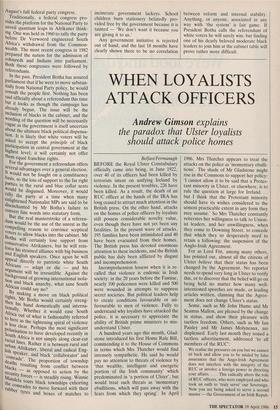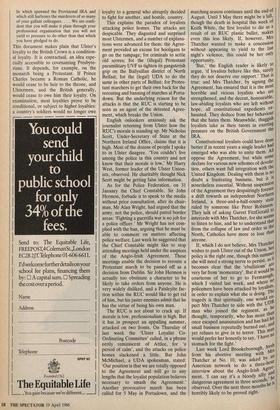WHEN LOYALISTS ATTACK OFFICERS
Andrew Gimson explains
the paradox that Ulster loyalists should attack police homes
Belfast/ Fermanagh BEFORE the Royal Ulster Constabulary officially came into being, in June 1922, over 40 of its officers had been killed by terrorists intent on unifying Ireland by violence. In the present troubles, 226 have been killed. As a result, the death of an RUC officer at the hands of the IRA has long ceased to attract much attention in the British press. On the other hand, attacks on the homes of police officers by loyalists still possess considerable novelty value, even though there have not yet been any fatalities. In the present wave of attacks, 195 families have been intimidated and 40 have been evacuated from their homes. The British press has devoted enormous attention to these incidents, and the British public has duly been afflicted by disgust and incomprehension. Incomprehension lessens when it is re- called that violence is endemic in Irish society: in the 20 years before the Famine, nearly 100 policemen were killed and 500 were wounded in attempts to suppress secret societies. But political leaders help to create conditions favourable or un- favourable to men of violence. Fully to understand why loyalists have attacked the police, it is necessary to appreciate the - ability of British prime ministers to mis- understand Ulster.
A hundred years ago this month, Glad- stone introduced his first Home Rule Bill, commending it to the House of Commons in terms which Mrs Thatcher would find intensely sympathetic. He said he would pay no attention to threats of violence by `that wealthy, intelligent and energetic portion of the Irish community' which predominated in 'a portion of Ulster', but would treat such threats as 'momentary ebullitions, which will pass away with the fears from which they spring'. In April 1986, Mrs Thatcher appears to treat the attacks on the police as 'momentary ebulli- tions'. The shade of Mr Gladstone might rise in the Commons to support her policy: `I cannot allow it to be said that a Protes- tant minority in Ulster, or elsewhere, is to rule the question at large for Ireland.. . but I think that the Protestant minority should have its wishes considered to the utmost practicable extent in any form they may assume.' So Mrs Thatcher constantly reiterates her willingness to talk to Union- ist leaders, and her unwillingness, when they come to Downing Street, to concede that which they so desperately need to retain a following: the suspension of the Anglo-Irish Agreement.
For as Lord Fitt, among many others, has pointed out, almost all the citizens of Ulster believe that their status has been changed by the Agreement. No reporter needs to spend very long in Ulster to verify this, or to discover that the belief will go on being held no matter how many well- intentioned speeches are made, or leading articles written, claiming that the Agree- ment does not change Ulster's status.
Some, such as Mr John Hume and Mr Seamus Mallon, are pleased by the change in status, and show their pleasure with tactless freedom. Others, such as Mr Ian Paisley and Mr James Molyneaux, are displeased. Early last month they issued a tactless advertisement, addressed `to all members of the RUC':
We realise the pressures on you but we cannot sit back and allow you to be misled by false assurances that the Ango-Irish Agreement does not interfere with the integrity of the RUC or involve a foreign power in directing your affairs. . . . This radically alters the role of RUC officers, who were employed and who took an oath to 'truly serve' our Sovereign.
Now you are being asked to serve a second master — the Government of an Irish Repub- lic which spawned the Provisional IRA and which still harbours the murderers of so many of your gallant colleagues. . . . We are confi- dent that you will make it plain through your professional organisation that you will not yield to pressure to do other than that which you have pledged to do.
This document makes plain that Ulster's loyalty to the British Crown is a condition- al loyalty. It is contractual, an idea espe- cially accessible to covenanting Presbyte- rians. It depends, for example, on the monarch being a Protestant. If Prince Charles became a Roman Catholic, he would cease to be heir to the throne, and Ulstermen, and the British generally, would cease to owe him their loyalty. On examination, most loyalties prove to be conditional, or subject to higher loyalties: a country's soldiers would no longer owe loyalty to a general who abruptly decided to fight for another, and hostile, country.
This explains the paradox of loyalists attacking police homes. The attacks are despicable. They disgusted and surprised most Ulstermen, and a number of explana- tions were advanced for them: the Agree- ment provided an excuse for hooligans to go on the rampage; for criminals to settle old scores; for the (illegal) Protestant paramilitary UVF to tighten its gangsterish grip on the Ballysillan district of North Belfast; for the (legal) UDA to do the same in other parts of Belfast; for Protes- tant marchers to get their own back for the rerouting and banning of marches at Porta- down. But the underlying reason for the attacks is that the RUC is starting to be seen as an agent of the detested Agree- ment, which breaks the Union.
English onlookers anxiously ask the journalist returning from Ulster how the RUC's morale is standing up. Mr Nicholas Scott, Under-Secretary of State at the Northern Ireland Office, claims that it is high. Most of the dozens of people I spoke to in Ulster disagree. 'You couldn't live among the police in this country and not know that their morale is low,' Mr Harry West, former leader of the Ulster Union- ists, observed. He charitably thought Nick Scott might be getting false information.
As for the Police Federation, on 31 January the Chief Constable, Sir John Hermon, forbade it to speak to the media without prior consultation, after its chair- man, Mr Alan Wright, had argued that the army, not the police, should patrol border areas: 'Fighting a guerrilla war is no job for a police officer.' Mr Wright has not com- plied with the ban, arguing that he must be able to comment on matters affecting police welfare. Last week he suggested that the Chief Constable might like to stop attending meetings held under the auspices of the Anglo-Irish Agreement. These meetings enable the decision to reroute a Protestant march to be passed off as a decision from Dublin. Sir John Hermon is actually too obstinate a character to be likely to take orders from anyone. He is very widely disliked, and a Paisleyite fac- tion within the RUC would like to get rid of him, but his juster enemies admit that he has the virtue of being his own man.
The RUC is not about to crack up. If morale is low, professionalism is high. But it has in prospect an appalling summer, attacked on two fronts. On Thursday of last week the 'Ulster Loyalist Co- Ordinating Committee' called, in a phrase eerily reminiscent of Attlee, for 'a period of calm', and the attacks on police homes slackened a little. But John McMichael, a UDA spokesman, stated: `Our position is that we are totally opposed to the Agreement and will go to any lengths that the loyalist population believes necessary to smash the Agreement.' Another provocative march has been called for 5 May in Portadown, and the marching season continues until the end of August. Until 5 May there might be a lull, though the death in hospital this week of Keith White, the first loyalist to die as a result of an RUC plastic bullet, makes even this less likely. If, however, Mrs Thatcher wanted to make a concession without appearing to yield to the last night's violence, this could be her only opportunity. `But,' the English reader is likely to argue, 'if loyalists behave like this, surely they do not deserve our support.' That is true: and Mrs Thatcher, by signing the Agreement, has ensured that it is the most horrible and vicious loyalists who are strengthened, and the decent, honourable, law-abiding loyalists who are left without hope, all constitutional expedients ex- hausted. They deduce from her behaviour that she hates them. Meanwhile, thuggish loyalists take as their tutors in exerting pressure on the British Government the IRA.
Constitutional loyalists could have done better if in recent years a single leader had emerged who was able to unite them. All oppose the Agreement, but while some declare for various new schemes of devolu- tion, others want full integration with the United Kingdom. Dealing with them is no doubt a frustrating business, but it is nonetheless essential. Without suspension of the Agreement they despairingly foresee a drift towards an independent Northern Ireland, a three-and-a-half-county state ruled by someone like Peter Robinson. They talk of asking Garret FitzGerald to intercede with Mrs Thatcher, for she seals to listen to him, and he to understand that from the collapse of law and order in the North, Catholics have more to lose than anyone. If, which I do not believe, Mrs Thatcher wishes to push Ulster out of the Union, her policy is the right one, though this summer she will need a strong nerve to persist, as it becomes clear that the 'ebullitions' are very far from 'momentary'. But it would be courteous of her to go to Fermanagh' which I visited last week, and where no policemen have been attacked by loyalists, in order to explain what she is doing. The tragedy is that spiritually, one would ex ii pect Mrs Thatcher to side with the UDR man who joined the regiment, as he thought, temporarily, who has more than" once escaped assassination and has had !Iis small business repeatedly burned out, and yet refuses to give in to terror. This Mai' would prefer her honestly to say, 'I have no stomach for the fight.' Last week Lord Brookeborough, fr,esbs from his abortive meeting with mr., Thatcher at No. 10, was asked by a.P., American network to do a three-hotf, interview about the Anglo-Irish AgreA ment. 'I can say it's a bloody silly age dangerous agreement in three seconds, 1.1,, observed. Over the next three months he horribly likely to be proved right.



















































 Previous page
Previous page